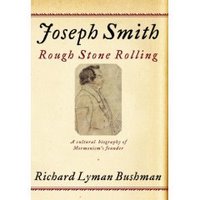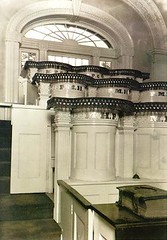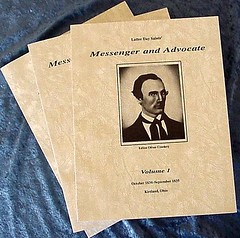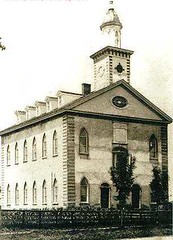The Book of Mormon Protests Modern Culture

On my personal blog, I started posting some thoughts (here, here, and here) as I read through Joseph Smith Rough Stone Rolling, by Professor Richard Bushman. Well into chapter 4, Bushman has a subsection entitled America and Israel, pages 101 to 105. He points out that The Book of Mormon can be read as a nationalist text because of its ancient history of the American continent back to several millennia before Christ, and up to 400 A.D.
Bushman's text relates how Nephi sees the trans Atlantic crossing of Columbus, as well as the American Colonists, who escape their mother Gentiles. Nephi also foreshadows the American Revolution, and God's power delivering the "Gentle migrants", as they subsequently "prosper in the land."
But, Bushman explains:
See Rough Stone Rolling p. 102.
[T]he American story does not control the narrative. The Book of Mormon allots just nine verses to the deliverance of the Gentiles, and the rest of the book concentrates on the deliverance of Israel.
I have always found fascinating the fact that Book of Mormon governments were never democratic, or constitutional, similar to the American prototype. Yet, as Bushman points out, The Book of Mormon is less concerned about Liberty as it is about personal responsibility and Israel, God's Covenant people:
American constitutionalism is faintly invoked and then dismissed. Book of Mormon governments are monarchies and judgeships,, Old Testament governments, not democratic legislatures and elected presidents . . . Mosiah is "exceedingly anxious that every man should have an equal chance," but by equal chance he means personal responsibility for one's own sins, not an equal opportunity to get ahead.For an ancient American historical text Bushman's description of The Book of Mormon here is decidedly, well . . . almost Anti-American. America has rejected monarchy since Her inception and the bloody revolution that gave birth to our constitutional republic. Yet, this most American of scripture, is clearly at odds with our own modern day America. This, I think, is also consistent with Joseph's own almost monarchial rule over the early Church while he was alive. There was no room for democracy in the early Church. While there are differences between a monarch and Prophet, both are far afield from democracy as we live in today.
Bushman continues:
The Book of Mormon does not plant seeds of democracy in the primeval history of the nation. Instead of tracking the history of liberty, as a nationalist work he might be expected to do, The Book of Mormon endlessly expounds the master biblical narrative–the history of Israel. Israel’s covenant with God, Israel’s rebellion and apostasy, and Israel’s eventual restoration–Isaiah’s basic themes–recur nearly a dozen times.See Rough Stone Rolling pp. 101-02.
If this seems to be backwards, at least from an American historical perspective, Bushman is just getting warmed up:
All this turned American history upside down. The story of Israel overshadowed the history of American liberty. Literal Israel stood at the center of history, not the United States . . . The Book of Mormon was the seminal text, not the Constitution or the Declaration of Independence. The gathering of Lost Israel, not the establishment of liberty, was the great work. In the Book of Mormon, the biblical overwhelms the national. Taken as a whole, the Book of Mormon can be read as a “document of profound social protest” against the dominant culture of Joseph Smith’s time.
Bushman’s political and cultural indictment of America is profound:
[O]n closer reading, the Book of Mormon contests the amalgam of Enlightenment, republican, Protestant, capitalist and nationalist values that constituted American culture. The combination is not working, the book says. America is too Gentile, too worldly, too hard-hearted. The Gentiles “put down the power and miracles of God, and preach up unto themselves, their own widsom, and their own learning, that they may get gain, and grind upon the faces of the poor.” The nation must remember God and restore Israel–or be blasted.”See Rough Stone Rolling p. 104.
This is vintage Nibley, and a stark reminder for our own time. It parallels the powerful promise Christ makes throughout the Book of Mormon about America, and the various cultures who have and will people Her lands: Keep the commandments and we will prosper; however, if we reject the God of this land, Jesus Christ, we will be swept off the face of the land.
Finally:
The Book of Mormon proposes a new purpose for America: becoming a realm of righteousness rather than an empire of liberty. Against increasing wealth and inequality, the Book of Mormon advocates the cause of the poor . . . Against republican government, it proposes righteous rule by judges and kings under God’s law . . . Against skepticism, it promotes belief; against nationalism, a universal Israel. It foresees disaster for the nation if the love of riches, resistance to revelation, and Gentile civilization prevail over righteousness, revelation, and Israel.
See Rough Stone Rolling p. 105.
So, how are we doing in our quest for a realm of righteousness in modern day America? Are we too Gentile, too worldly, too hard hearted? Or, do we advocate for the poor, rather than increasing our own wealth and inequality? Do we have, or do we seek righteous rule under God’s law? Do our churches put down the power and miracles of God? Do our churches preach up unto themselves, their own wisdom and learning to get gain? And, what about us within the LDS community, are we any closer? Professor Bushman, I think poses some very hard questions not just for America, but for those of us who are weak and the weakest of all saints, who are or can be called saints.
Update: Clark Goble over at Mormon Metaphysics has compiled a page linking in one convenient place all the Bloggernacle discussion of Bushman's Rough Stone Rolling. Check it out. The discussion is great. I think the best overall review of RSR is Nate Oman's over at Times and Seasons.







3 Comments:
It's a little tangental to Bushman's point, but I've often noted that Nephi really uses the Old Testament - especially Moses and the trials in the desert - as a kind of type for his day and travails. It wouldn't be that surprising that we find Joseph doing the same, perhaps affecting the how of the translation process.
Clark, Interesting. Joseph certainly had his share of virulent opposition and trials during this period.
The reference to "personal responsibility" is interesting.
I am not aware of any case where appeals to personal virtue have ever improved a polis. On the contrary, frequently such appeals only justified coercion.
Yelling at people that they need to be righteous only brings us the Robespierre's terror and Pol Pot's killing fields. Arguably, Madison's solution is superior.
Post a Comment
<< Home